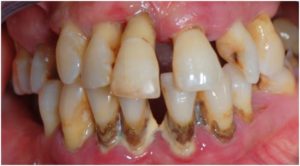Decay (cavities) are the result of negative effects of bacterial acid on your teeth. Acid is a byproduct of bacterial fermentation of food left on your teeth by not brushing your teeth correctly or just forgetting to.
Q: Are there foods that can cause decay to form quicker?
A: Carbohydrate-rich foods, such as sugars and sodas can cause the bacteria in your mouth to produce acid at a faster rate. This acid, in combination with other acids, will slowly dissolve the protective enamel away that’s when decay occurs.
Q: Can my teeth repair themselves?
A: No, once the enamel has been penetrated, then the tooth needs to be repaired with a filing or a crown.
Q: What will happen if I leave the cavity alone?
A: The bacterial acid will continue to decay the tooth. When the decay reaches the nerve of the tooth, this will cause an infection of the nerve. Once this happenes, your tooth will need to have root canal therapy. That is when the infected nerve is removed to stop the pain. However, if the infection is treated too late, then your tooth may not be savable and will need to be extracted to prevent the infection from spreading to the neighboring teeth and bone.
Q: Are there other situations that can cause cavities to develop quicker?
A: If you have a dry mouth, acid levels in the mouth rise faster because your saliva is not present to dilute and neutralize the effects of the bacterial acids.
Q: Can I avoid developing cavities?
A: Absolutely. Brushing and flossing at least 2 times a day can help prevent cavities from developing. This includes brushing your teeth using an electric or manual toothbrush, as well as using dental floss to clean between your teeth. However you also need a professional cleaning every 3-6 months. You may also be prescribed prescription-strength fluoride toothpaste, or fluoride trays to help strengthen your teeth, depending on your needs.
Gingivitis is an inflammation of the gums. As food debris, plaque, and tartar accumulate around and under the gums, bacteria producing acids are created which can cause cavities. These acids can also be detrimental to your gums. When your gums bleed easily and become red when touched, it’s time to see a prosthodontist.
Q: What will happen if gingivitis is not treated quickly?
A: Gingivitis can become a more serious form of gum disease known as periodontistis, which is a chronic infection of the gums and surrounding bone causing the teeth to become loose which leads to tooth loss, and is often associated with having bad breath and a lingering mal-odor taste in the mouth.
Q: How can I reverse gingivitis and prevent periodontitis from developing?
A: Proper teeth cleaning, preferably with an electric toothbrush at home, prevents gingivitis and bleeding gums. You will also have to have your teeth professionally cleaned at least once every 6 months by a dental hygienist. This is a very manageable disease if proper care is maintained by you and your prosthodontics team.
Periodontitis (gum disease) This is a chronic infection of the gums and underlying bone that can destroy the bone that supports the teeth.
Q: What will happen to untreated gum disease/periodontitis?
A: When this condition is left untreated, periodontitis (gum disease), can result in tooth loss. Gum disease is also linked with diabetes and/ or coronary artery disease.
Q: What are some risks factors of gum disease/periodontitis?
A: Poor oral hygiene is the most obvious cause of gum disease, yet numerous risk factors can increase one’s chances of developing gum disease. These factors include: stress, diabetes, tobacco use, family history of the disease, and in women, changes in hormones connected with menopause and/ or pregnancy.
Q: What can I do to prevent advanced gum disease/periodontitis?
A: Thorough and frequent teeth cleaning prevents gum disease and bleeding gums. However, when this issue has worsened to periodontitis, you will need a more thorough cleaning to get rid of the infection and resultant bleeding from the bacteria within your gums. Your dentist or prosthodontist will be able to assess healthy progress and design a program of follow-up visits that is best for you, after proper treatment.

NOVA Premier Dental helps with this problem through offering our various Services.
Nova Premier Dental
313 Park Ave #306 Falls Church, VA 22046
(703) 532-7586
